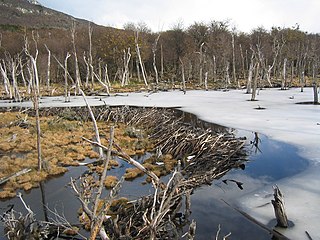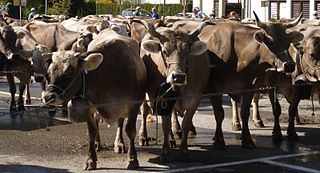
Alaska is a U.S. state located on the northwest extremity of the country's West Coast, just across the Bering Strait from Asia. An exclave of the U.S., it borders the Canadian province of British Columbia and territory of Yukon to the east and southeast and has a maritime border with Russia's Chukotka Autonomous Okrug to the west. To the north are the Chukchi and Beaufort seas of the Arctic Ocean, while the Pacific Ocean lies to the south and southwest.

Christopher Columbus was an Italian explorer and navigator who completed four voyages across the Atlantic Ocean, opening the way for European exploration and colonization of the Americas. His expeditions, sponsored by the Catholic Monarchs of Spain, were the first European contact with the Caribbean, Central America, and South America.

Hawaii is a state of the United States of America located in the Pacific Ocean. It is the only U.S. state located outside North America, the only island state, and the only state in the tropics.
Native Americans, also known as American Indians, Indigenous Americans and other terms, are the indigenous peoples of the United States, except Hawaii and territories of the United States. There are 574 federally recognized tribes living within the US, about half of which are associated with Indian reservations. The term "American Indian" excludes Native Hawaiians and some Alaskan Natives, while "Native Americans" are American Indians, plus Alaska Natives of all ethnicities. The US Census does not include Native Hawaiians, Samoans, or Chamorros, instead being included in the Census grouping of "Native Hawaiian and other Pacific Islander".

Trout is the common name for a number of species of freshwater fish belonging to the genera Oncorhynchus, Salmo and Salvelinus, all of the subfamily Salmoninae of the family Salmonidae. The word trout is also used as part of the name of some non-salmonid fish such as Cynoscion nebulosus, the spotted seatrout or speckled trout.

An invasive species is a non-native species that spreads from the point of introduction and becomes abundant.

A first language, native tongue, native language, or mother/father/parent tongue, is a language that a person has been exposed to from birth or within the critical period. In some countries, the term native language or mother tongue refers to the language of one's ethnic group rather than one's first language.

An introduced species, alien species, exotic species, foreign species, non-indigenous species, or non-native species is a species living outside its native distributional range, but which has arrived there by human activity, either deliberate or accidental. Non-native species can have various effects on the local ecosystem. Introduced species that become established and spread beyond the place of introduction are considered "naturalized". The process of human-caused introduction is distinguished from biological colonization, in which species spread to new areas through "natural" (non-human) means such as storms and rafting.

The encomienda was a Spanish labor system that rewarded conquerors with the labor of particular groups of conquered non-Christian people. The laborers, in theory, were provided with benefits by the conquerors for whom they labored, the Catholic religion being a principal benefit. The encomienda was first established in Spain following the Christian conquest of Moorish territories, and it was applied on a much larger scale during the Spanish colonization of the Americas and the Spanish Philippines. Conquered peoples were considered vassals of the Spanish monarch. The Crown awarded an encomienda as a grant to a particular individual. In the conquest era of the sixteenth century, the grants were considered to be a monopoly on the labor of particular groups of indigenous peoples, held in perpetuity by the grant holder, called the encomendero, and his or her descendants.

Alaska Natives or Alaskan Natives are indigenous peoples of Alaska, United States and include: Iñupiat, Yupik, Aleut, Eyak, Tlingit, Haida, Tsimshian, and a number of Northern Athabaskan cultures. They are often defined by their language groups. Many Alaska Natives are enrolled in federally recognized Alaska Native tribal entities, who in turn belong to 13 Alaska Native Regional Corporations, who administer land and financial claims.
Over two billion people speak English, making English the largest language by number of speakers, and the third largest language by number of native speakers. The United Kingdom and the United States with 60 million and 230 million respectively, have the most native speakers. Additionally, there are 29 million in Canada, 24.1 million in Australia, 5 million in New Zealand, and 5 million in Ireland.

Native Hawaiians are the Aboriginal Polynesian people of the Hawaiian Islands or their descendants. Native Hawaiians trace their ancestry back to the original Polynesian settlers of Hawaiʻi. In the 2010 US census, 527,000 people identified as Native Hawaiian.

An Indian reservation is a legal designation for an area of land managed by a federally recognized Indian tribe under the U.S. Bureau of Indian Affairs rather than the state governments of the United States in which they are physically located. Each of the 326 Indian reservations in the United States is associated with a particular Native American nation. Not all of the country's 567 recognized tribes have a reservation—some tribes have more than one reservation, while some share reservations. In addition, because of past land allotments, leading to some sales to non–Native Americans, some reservations are severely fragmented, with each piece of tribal, individual, and privately held land being a separate enclave. This jumble of private and public real estate creates significant administrative, political, and legal difficulties.

The indigenous peoples of the Americas are the pre-Columbian peoples of North, Central and South America and their descendants.
Native Americans may refer to:
Race and ethnicity in the United States is a complex topic because the United States of America has a racially and ethnically diverse population. At the federal level, race and ethnicity have been categorized separately.

The peyote, scientific name Lophophora williamsii, is a small, spineless cactus with psychoactive alkaloids, particularly mescaline. Peyote is a Spanish word derived from the Nahuatl peyōtl[ˈpejoːt͡ɬ], meaning "caterpillar cocoon", from a root peyōni, "to glisten". Peyote is native to Mexico and southwestern Texas. It is found primarily in the Sierra Madre Occidental, the Chihuahuan Desert and in the states of Nayarit, Coahuila, Nuevo León, Tamaulipas, and San Luis Potosí among scrub. It flowers from March to May, and sometimes as late as September. The flowers are pink, with thigmotactic anthers.

Slavery among Native Americans in the United States includes slavery by and slavery of Native Americans roughly within what is currently the United States of America.

Two-Spirit is a modern, pan-Indian, umbrella term used by some Indigenous North Americans to describe Native people in their communities who fulfill a traditional third-gender ceremonial and social role in their cultures.














